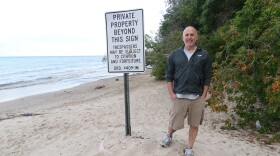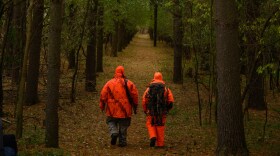-
Last weekend, dangerously low temperatures hit the Milwaukee area. Shelters opened their doors and stretched their capacity to assist as many residents as possible, including Cathedral Center in downtown Milwaukee.
-
The National Weather Service issued an “extreme cold watch" for southern Wisconsin from Jan. 22-24. Milwaukee-based meteorologist Paul Roebber explains what's causing the bitter cold.
NPR stories
WUWM stories
-
Lake Michigan’s shoreline is a great place for duck-watching in the winter. Common Goldeneye, Red-breasted Merganser and Greater Scaup are species you’ll regularly see.
-
Robin Greenfield is two months into a year-long quest to live on food he’s foraged. He hopes to inspire others to think about how our day-to-day decisions impact the world we share.
-
The Wisconsin Department of Justice is about to settle a lawsuit in a PFAS contamination case in northeastern Wisconsin. Affected residents wonder if the settlement will lead to PFAS-free drinking water.
-
SBC Executive Director Jessy Servi Ortiz speaks about the council's Green Masters Program and the current landscape for sustainability in the business community.
-
Wisconsin boasts about 400 miles of Lake Michigan shoreline. But a dispute in the village of Shorewood brings up an age-old question: who has access to that shoreline?
-
The Wisconsin DNR says over 212,000 deer have been harvested so far this hunting season.
-
Wisconsin's Christmas tree suppliers are choosing between providing the cheapest tree possible, or creating an experience complete with sleigh rides and holiday cheer.
-
The Wisconsin DNR is providing bottled water to more than 1,700 households because of PFAS contamination in their drinking water. One impacted community, the Town of Campbell, has come up with its own solution.
-
A man who moves buildings for a living hopes to relocate homes and barns that otherwise will be demolished as a Port Washington data center complex takes shape.
-
Data centers are known for using huge amounts of water. Is that water usage regulated? If so, by whom?


























